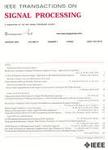版权所有:内蒙古大学图书馆 技术提供:维普资讯• 智图
内蒙古自治区呼和浩特市赛罕区大学西街235号 邮编: 010021

作者机构:UNIV CALIF DAVIS DEPT ELECT & COMP ENGN DAVIS CA 95616 USA
出 版 物:《IEEE TRANSACTIONS ON SIGNAL PROCESSING》 (IEEE Trans Signal Process)
年 卷 期:1995年第43卷第12期
页 面:2898-2908页
核心收录:
基 金:Office of Naval Research ONR (N00014-92-5-1218)
主 题:Adaptive filters Algorithm design and analysis Sensor arrays Signal analysis Signal design Filtering algorithms Calibration Adaptive arrays Sensor systems and applications Intelligent sensors
摘 要:We present a new framework known as the programmable canonical correlation analysis (PCCA) for the design of blind adaptive spatial filtering algorithms that attempt to separate one or more signals of interest from unknown cochannel interference and noise. Unlike many alternatives, PCCA does not require knowledge of the calibration data for the array, directions of arrival, training signals, or spatial autocorrelation matrices of the the noise or interferers. A novel aspect of PCCA is the ease with which new algorithms, targeted at capturing all signals from particular classes of interest, can be developed within this framework. In this paper, several existing algorithms are unified within the PCCA framework, and new algorithms are derived as examples. Analysis for the infinite-collect case and simulation for the finite-collect case illustrate the operation of specific algorithms within the PCCA framework.